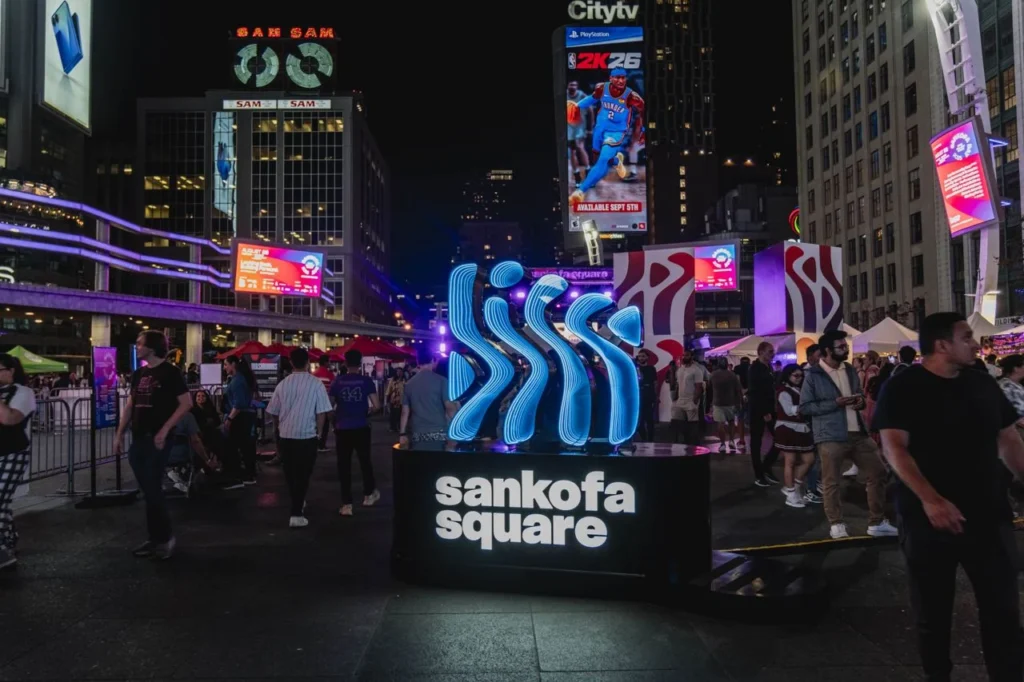Ghana’s Tourism Authorities Inaugurate ‘Sankofa Square’ in Toronto

In a momentous celebration of culture, history, and remembrance, the city of Toronto officially inaugurated Sankofa Square—formerly known as Yonge-Dundas Square—on Saturday, marking a significant step toward recognizing African heritage and confronting the legacies of colonialism and slavery.
The renaming ceremony, which coincided with the International Day for the Remembrance of the Slave Trade and its Abolition, took place in the heart of downtown Toronto. The square, one of the city’s most prominent public spaces, was rebranded following an extensive community-led process aimed at addressing the controversial history associated with its previous name.
The new name, Sankofa, is derived from the Akan language of Ghana and is represented by a symbolic bird that turns its head backward to retrieve an egg from its back—signifying the importance of looking to the past to inform and guide the future. It embodies the values of memory, cultural preservation, and ancestral wisdom.
A release from the Ghana News Agency stated that the renaming followed a two-year review by the Recognition Review Community Advisory Committee, which included input from Black and Indigenous leaders, local residents, and businesses. The previous namesake, Henry Dundas, was a Scottish politician known for delaying the abolition of the transatlantic slave trade—a legacy that prompted calls for change.
Saturday’s launch was vibrant and reflective, with festivities under the theme “Looking Back, Building Forward.” The day featured storytelling, traditional African music and dance, sports activities, cultural exhibitions, Ghanaian cuisine, and a showcase of products made in Ghana. The Ghanaian Canadian Association of Ontario (GCAO) played a leading role in organizing the event, reflecting the strong presence and contribution of Ghanaian-Canadians.
Representing the Ghanaian government was Madam Abla Dzifa Gomashie, Minister for Tourism, Arts and Culture, along with Mr. James Gyakye Quayson, Deputy Minister of Foreign Affairs, who stood in for President John Dramani Mahama.
Delivering her keynote address, Madam Gomashie emphasized that the renaming was more than symbolic—it was a bold statement of remembrance and restoration. “Sankofa Square is a space for healing, for reclaiming identity, and for honouring the enduring strength of African peoples across the globe,” she said.
She also highlighted Ghana’s cultural diplomacy efforts through initiatives such as PANAFEST, the Year of Return, and Beyond the Return, and introduced the Black Star Experience—a cultural platform aimed at deepening diaspora engagement. She envisioned Sankofa Square becoming a hub for cultural dialogue, learning, and exchange.
Deputy Minister Quayson spoke of the deep, shared histories between African descendants and other diaspora communities, urging unity in remembrance and a collective move toward justice. He also announced the upcoming Sankofa Freedom Movement Project, scheduled for launch in 2026 in Toronto.
The event received strong support from local leadership. Toronto Mayor Olivia Chow and City Councilor Chris Moise reaffirmed their commitment to equity, anti-racism, and inclusive policymaking. They praised the renaming as a necessary and transformative step in acknowledging the past while shaping a more just future.
The decision to rename the square was passed by a Toronto City Council vote of 17–6, demonstrating the city’s growing resolve to confront historical wrongs and foster reconciliation.
Representatives from the Ghana Tourism Authority (GTA), including Mr. Kofi Atta Kakra Kusi, Deputy Director of Corporate Affairs, and Ms. Sena Sadat Abdulai, Project Officer, used the occasion to promote Ghana as a destination rich in heritage and cultural significance. They encouraged Canadians and members of the diaspora to visit and explore Ghana’s unique historical and tourism offerings.
The dedication of Sankofa Square stands as a powerful testament to the enduring relevance of cultural memory and international solidarity. It symbolizes a shared commitment to truth, justice, and a future informed by the lessons of the past.







